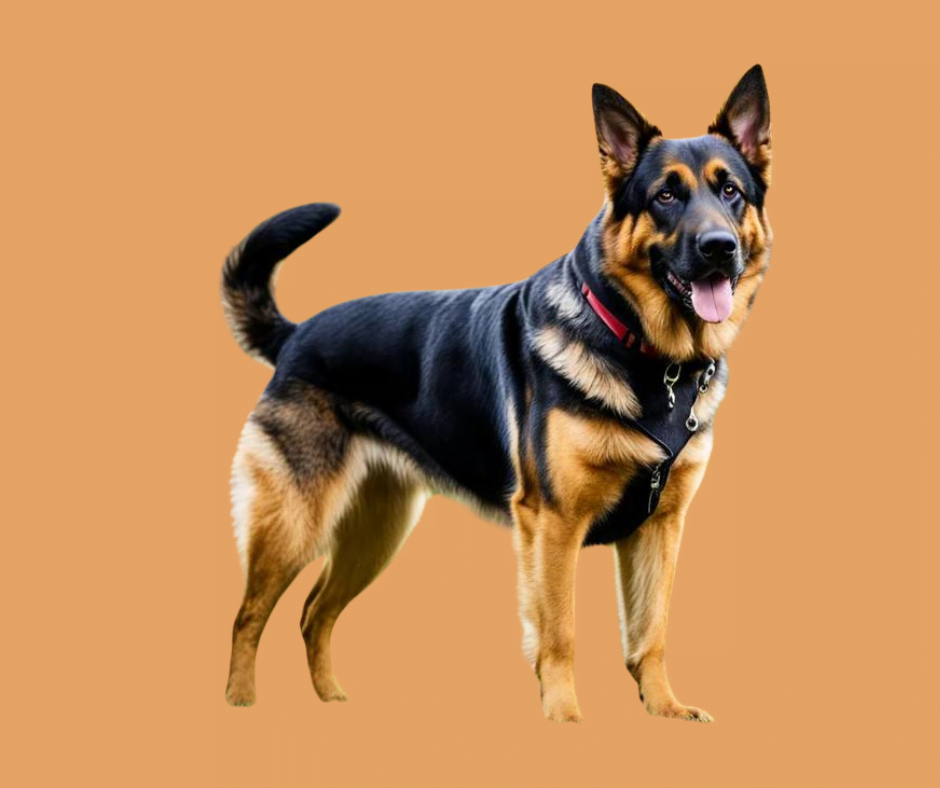Do You Know the Name of the German Shepherd and Rottweiler Mix Dog?
It’s Shepweiler!
Meet the Shepweiler, a special mix of German Shepherd and Rottweiler. This dog is smart, loyal, and loves to protect its family.
If you’re looking for a buddy who will stick by your side and watch over you, the Shepweiler might be your match.
But hold on. Before you Go out to get one, there are some things you need to know.
These dogs are full of energy and need lots of exercise. They also need good training to be their best.
So Know what makes the Shepweiler so unique and see if this mix is the right fit for you.
Read Also: Is a German Shepherd Rottweiler Mix Right for You? Read This First!
Origins of the Shepweiler( German Shepherd Rottweiler Mix)
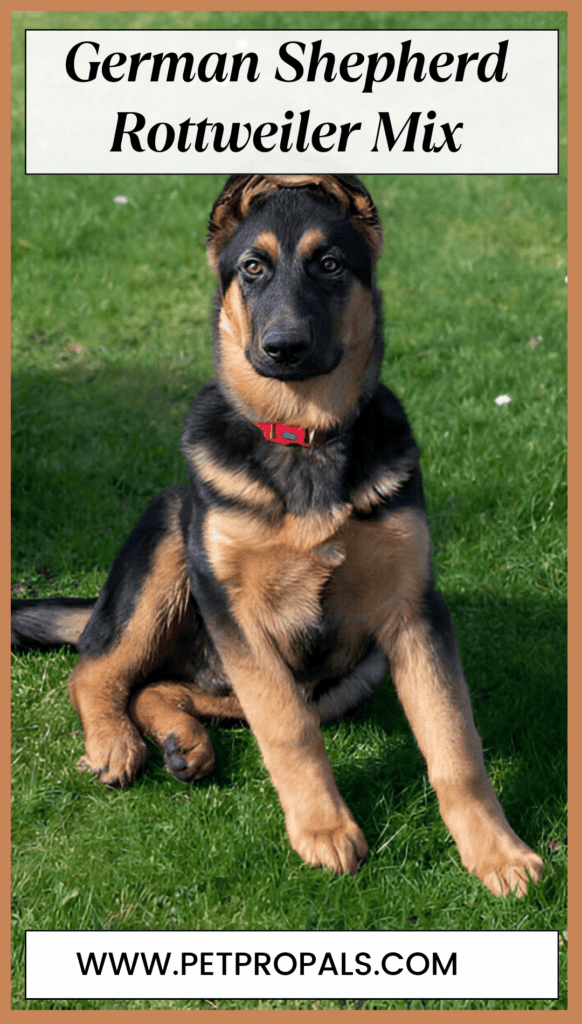
To understand the Shepweiler, we need to look at the history and traits of its parent breeds: the German Shepherd and the Rottweiler.
German Shepherds are famous for their intelligence and work ethic. They were first bred in Germany in the late 19th century to help herd sheep and protect livestock.
Over time, their smarts and loyalty made them popular as police and service dogs.
Rottweilers, on the other hand, have a history that goes back to ancient Rome. These dogs were used by Roman soldiers to herd cattle and guard their camps.
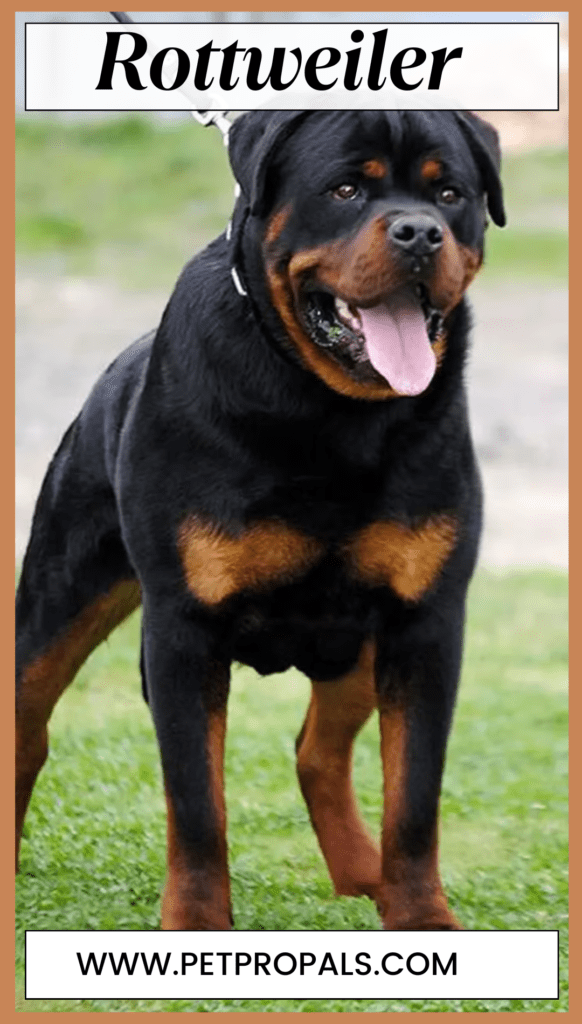
Later, they became known as reliable working dogs in the German town of Rottweil, giving them their name. Rottweilers are strong, confident, and protective.
The combination of these two breeds, resulting in the Shepweiler, has gained popularity recently.
People are drawn to Shepweilers because they often inherit the best traits from both parents.
They are loyal, smart, and protective qualities that many dog lovers find appealing.
As more people discover the benefits of this mix, Shepweilers are becoming a favored choice for families and individuals seeking a dedicated and capable companion.
Physical Characteristics Of the Shepweiler( German Shepherd Rottweiler Mix)
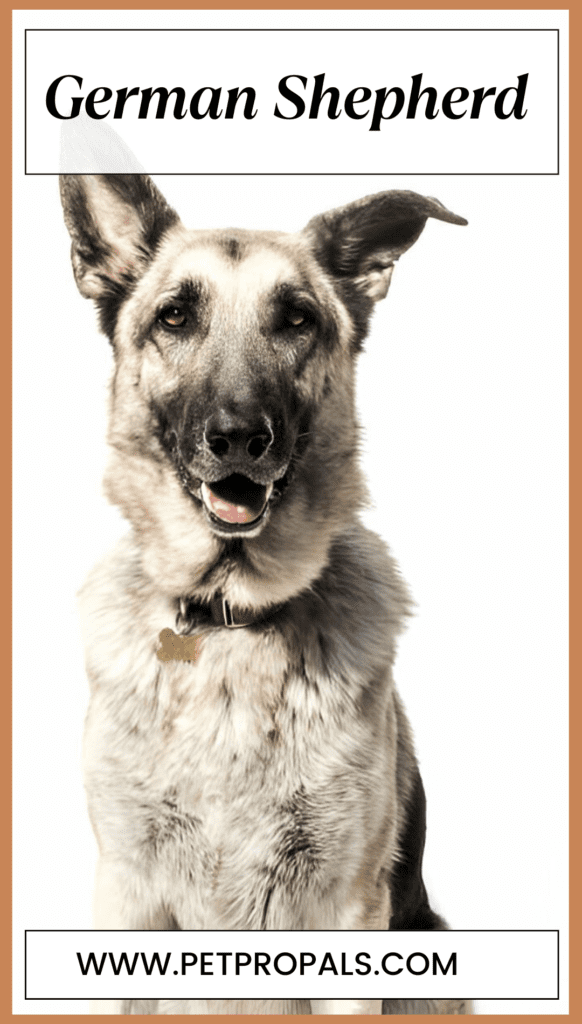
A Shepweiler usually looks like a mix of its German Shepherd and Rottweiler parents. They are often large and muscular, with a strong and sturdy build.
Their heads are broad, and they can have the expressive eyes of a German Shepherd or the intense gaze of a Rottweiler.
Their ears might be upright like a German Shepherd’s or slightly floppy like a Rottweiler’s. The overall look has a commanding and noble presence.
Size and Growth
When it comes to size, Shepweilers are typically large dogs. They usually stand between 22 to 27 inches tall at the shoulder.
Their weight can range from 75 to 115 pounds, depending on genetics and diet.
These dogs grow quickly in their first year and may continue to fill out until they are around two years old.
It’s important to monitor their growth and ensure they have a balanced diet to support their development.
Coat Type and Grooming Needs
Shepweilers have a double coat, combining a dense undercoat with a thicker topcoat. This coat can be short to medium in length and is usually straight.
They tend to shed moderately year-round, with heavier shedding seasons in the spring and fall.
Grooming a Shepweiler involves regular brushing to keep their coat healthy and to manage shedding.
Aim to brush your Shepweiler at least once a week, and more frequently during heavy shedding periods.
Regular baths every few months will help keep their coat clean, but be careful not to over-bathe as this can strip the natural oils from their skin.
Routine care like trimming nails, cleaning ears, and brushing teeth will keep your Shepweiler looking and feeling their best.
Owning a Shepweiler
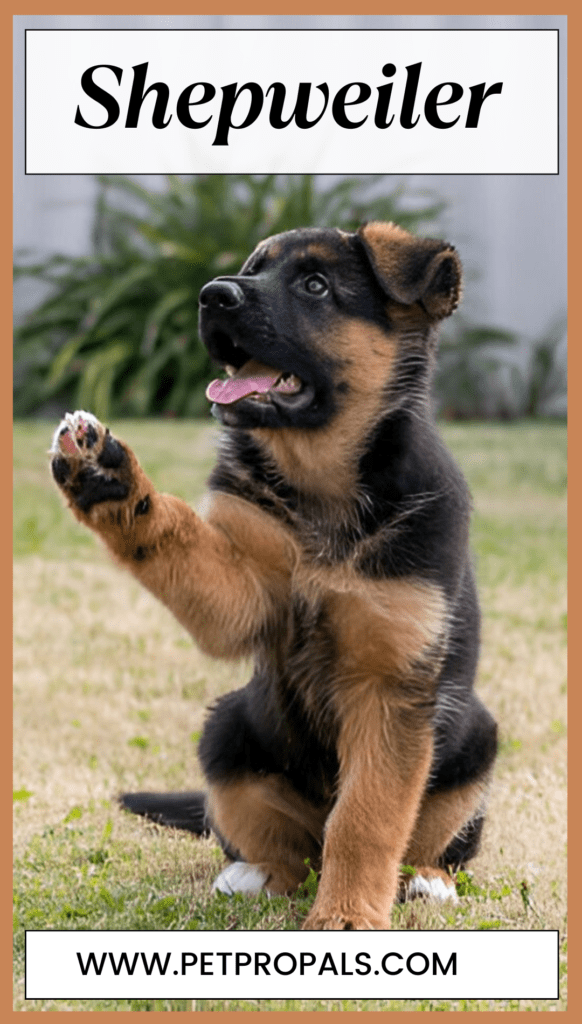
Considering bringing a Shepweiler into your life? It’s an enriching experience, but it comes with responsibilities.
Understanding their health and care needs is crucial.
Let’s explore the essential aspects of Shepweiler ownership to help you decide if they’re the right fit for you.
Potential Health Concerns
Like all dogs, Shepweilers can be prone to certain health issues, especially those common in their parent breeds. Here are some potential concerns:
- His Dysplasia
- Bloat
- elbow dysplasia
- heart problems
- eye conditions.
Hip Dysplasia: This is a genetic condition where the hip joint doesn’t fit together properly, which can lead to arthritis and pain.
Both German Shepherds and Rottweilers are susceptible to this condition.
Bloat: Also known as gastric torsion, bloat is a serious condition where the stomach fills with gas and twists.
It requires immediate veterinary attention and is more common in large, deep-chested breeds.
Other Issues: Shepweilers might also be prone to elbow dysplasia, heart problems, and certain eye conditions.
To keep your Shepweiler healthy, regular vet checkups are essential. Preventive care, such as vaccinations, dental care, and parasite control, can help avoid many health issues.
Lifespan and Care Needs
A Shepweiler usually lives for about 9 to 12 years. To ensure they enjoy a lengthy and healthy life, it’s essential to meet their specific care needs:
- Nutrition
- Grooming
- Exercise
- Training
Nutrition: Feed your Shepweiler a balanced diet with high-quality dog food. The right nutrition is crucial for their growth, energy levels, and overall health.
Avoid overfeeding to prevent obesity, which can exacerbate health issues.
Grooming: Regular grooming, as mentioned earlier, helps manage shedding and keeps their coat healthy.
Don’t forget routine tasks like nail trimming and teeth brushing.
Exercise: Shepweilers are energetic dogs and need plenty of exercise to stay happy and healthy.
Daily walks, playtime, and mental stimulation through training or interactive toys are vital. Aim for at least an hour of exercise each day.
Training: Early training and socialization are important. Shepweilers are intelligent and eager to please, but they can be strong-willed.
Consistent, positive reinforcement training will help them develop into well-behaved adults.
Temperament and Behavior
The temperament of a Shepweiler, like any dog, depends largely on how they are raised and trained.
They inherit strong guarding instincts from both the German Shepherd and Rottweiler parents, which can make them appear aloof or protective. However, aggression is not necessarily a default trait.
Proper training and early socialization are crucial for Shepweilers to become well-adjusted companions.
When raised in a loving environment with consistent guidance, they typically exhibit loyalty, intelligence, and a natural protectiveness towards their family and territory.
Early exposure to various people, animals, and situations helps mitigate any potential aggressive tendencies, ensuring they develop into friendly and confident dogs.
Cost and Value
How Much Does a German Shepherd Rottweiler Mix Cost?
The cost of a Shepweiler can vary widely depending on factors such as the breeder’s reputation, the lineage of the parents, location, and demand. On average, you can expect to pay between $500 to $2000 for a Shepweiler puppy.
It’s worth considering that the initial costs are just the beginning; the true value of owning a Shepweiler goes well beyond financial investment.
These dogs offer immense companionship, loyalty, and joy, enriching your life and becoming cherished members of your family when their temperament and needs align with your lifestyle.
Shedding and Coat Care
Shepweilers have a double coat that sheds moderately throughout the year, with heavier shedding periods typically occurring in the spring and fall.
Regular brushing, at least once a week, helps to manage loose hair and keep their coat healthy. During shedding seasons, more frequent brushing can minimize loose hair around your home and reduce matting.
General Care and Maintenance
To ensure your Shepweiler’s well-being, provide a balanced diet suited to their activity level and life stage.
Regular exercise is essential to keep them physically and mentally stimulated, as they are energetic dogs that thrive on activity.
Grooming should include nail trimming, teeth brushing, and ear cleaning as part of their routine care.
Inherited Traits and Temperament
Shepweilers often inherit the intelligence, loyalty, and protective instincts of the German Shepherd and Rottweiler breeds.
They are known for their alertness and can be naturally wary of strangers, making them effective watchdogs.
Early socialization and positive reinforcement training are crucial to help them develop into well-mannered companions.
Exercise Needs
Shepweilers are active dogs that benefit from regular exercise and mental stimulation.
Aim for at least an hour of physical activity each day, which can include walks, playtime, and interactive games.
Providing outlets for their energy helps prevent boredom and destructive behaviors.
Training Requirements
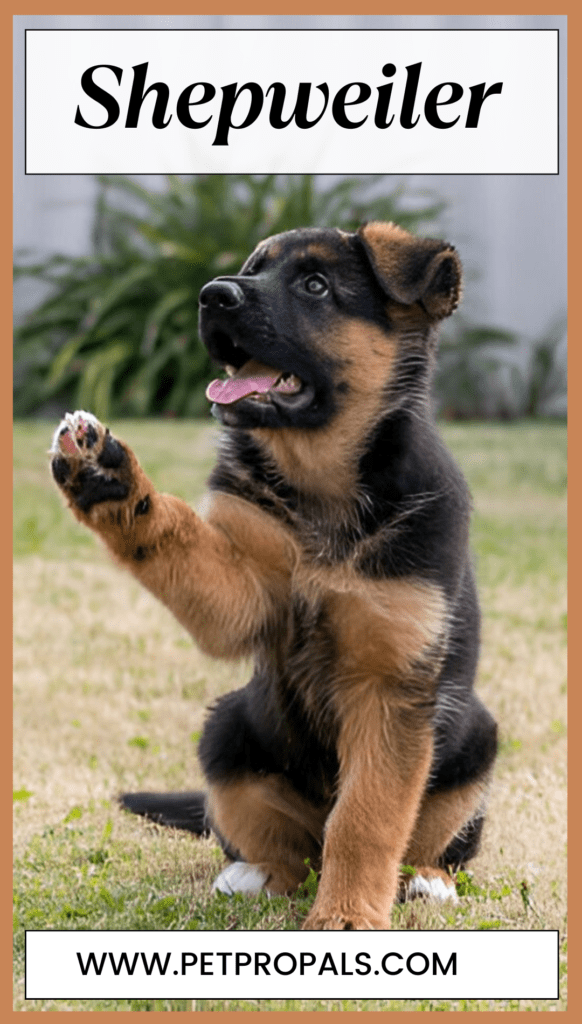
Shepweilers are intelligent and eager to please, making them trainable with consistent positive reinforcement.
They respond well to structured training sessions with praise and rewards for good behavior.
Early socialization is key to helping them become well-adjusted around people and other animals.
Making the Decision
Before bringing a Shepweiler into your home, consider the following:
- Lifestyle Compatibility
- Training Needs
- Care Requirements
Lifestyle Compatibility: Shepweilers thrive in active households with owners who can provide ample exercise and mental stimulation.
Training Needs: They are intelligent and trainable but require consistent training and early socialization to develop into well-behaved companions.
Care Requirements: Regular grooming, a balanced diet, and routine veterinary care are essential to ensure their health and well-being.
Resources for Further Research
For more information on Shepweilers and responsible pet ownership, consider these resources:
- Breed Associations
- Rescue Organizations
- Informative Websites
Breed Associations: The American Kennel Club (AKC) and United Kennel Club (UKC) provide breed standards and resources.
Rescue Organizations: Check out local rescue groups or visit websites like Petfinder to find Shepweilers available for adoption.
Informative Websites: Explore websites such as DogTime and The Spruce Pets for articles and guides on dog care and breed-specific information.
Encourage Responsible Pet Ownership
Responsible pet ownership includes:
- Choosing Ethical Breeders
- Consider Adoption
Choosing Ethical Breeders: Ensure breeders prioritize the health and well-being of their dogs, conduct health screenings, and provide proper socialization.
Consider Adoption: Adopting from shelters or rescue organizations gives loving homes to dogs in need and supports responsible pet ownership practices.
Conclusion
The Shepweiler is a mix of German Shepherd and Rottweiler, known for being loyal, smart, and protective.
They thrive with owners who can train them well, keep them active, and introduce them to different people and situations early on.
Shepweilers are best for active owners who have experience with dogs. They need lots of exercise and attention.
Their intelligence makes them great companions when given the right care and training.
Owning a Shepweiler is rewarding. They bring loyalty, friendship, and the joy of caring for a smart and protective dog.
With love and effort, they become a cherished part of the family, creating a strong bond that lasts a lifetime.
FAQs
Why are Shepweilers good at guarding?
Shepweilers inherit protective instincts from their German Shepherd and Rottweiler parents. They’re naturally watchful and make great watchdogs.
Are Shepweilers good for active people?
Yes, Shepweilers thrive with active owners who enjoy outdoor activities like hiking and playing fetch.
What makes Shepweilers different from other mixed breeds?
Shepweilers stand out for their intelligence and adaptability. They’re great as family pets or in roles like therapy work and obedience training.
Do Shepweilers look unique?
Yes, Shepweilers often have a strong build, expressive eyes, and come in various coat colors inherited from their German Shepherd and Rottweiler parents.
What skills are Shepweilers known for?
Shepweilers are smart and can learn tasks like search and rescue. They excel in jobs that require intelligence and dedication.
How can I make sure a Shepweiler fits my lifestyle?
Before getting a Shepweiler, think about if you can give them consistent training, plenty of exercise, and chances to meet new people and animals. This helps them be happy and healthy with you.

